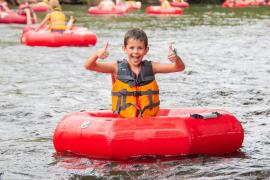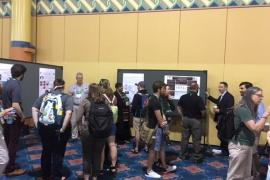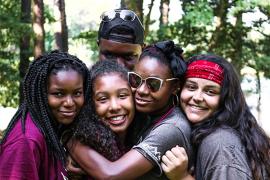As camp directors, we instinctually know that the experience is much better without smartphones and technology, but what do the campers themselves think? If this topic sounds familiar to you, there's a chance that you attended either my oral or poster presentation at the ACA National Conference last year in Nashville. Now, that work has been turned into an academic paper. The results of my research might surprise you . . .
The Study
For this study, I spoke with 45 participants in an overnight teen camper program. All campers were between the ages of 15–17, and many of them had been to this specific camp for multiple years. The "no cell phone" policy had been in place for a while and so the majority of the participants had experienced separation from their smartphone before. I asked them broad questions about the camp experience without their smartphone and how they felt camp would be different if smartphones were allowed. I've included a brief discussion of the overall findings in this blog.
Camp with Smartphones
Overall, campers felt that camp with smartphones just wouldn't be as much fun! While some campers talked about how smartphones would function as a barrier to participating in activities, most of the teens recognized that if campers were allowed smartphones, no one would interact with each other in person. Everyone would be scrolling through their newsfeed or Instagram and wouldn't bother to have a conversation with their other campers. One camper was very passionate, saying "I can't describe how phones would actually ruin camp."
Camp without Smartphones
Surprisingly, the majority of campers agreed with "no phone" policies and felt that camp was a better experience without smartphones. Campers described how because there are no phones allowed at camp, they are able to meet people and interact with them offline, form closer connections with others (including those they know from home), get a much-needed break from the expectations and pressures of social media, and have the opportunity to live in the moment.
So What?
What's the takeaway here? While in the article I discuss how many of these themes are applicable to a new model of social-emotional learning for adolescents in leisure contexts, I doubt this is new information to you. But now, since there's a research study supporting it, I challenge you to think about what you can do with this information.
Do you already have a smartphone policy at your camp? If so, how can you promote the positive aspects of a tech-free experience from a camper's perspective? Would this information be interesting to parents and campers? Will it help you promote the positive outcomes of an experience at your camp? I'd love to know what you think and how you might move forward with the findings from this research. Let's put research into practice!
Thanks for reading!
Note: This blog was originally published on September 16, 2019. It was edited January 6, 2020, with an updated link to the academic paper by Victoria Povilaitis.
Victoria Povilaitis, a research assistant for ACA, is a doctoral student at the University of Utah and has worked in the camp industry in a variety of roles, including staffing coordinator, athletic director, and sports coach.
Photo courrtesy of Camp Cherith in Pendleton, SC.
Thanks to our research partner, Redwoods.
Additional thanks goes to our research supporter, Chaco.
The views and opinions expressed by contributors are their own and do not necessarily reflect the views of the American Camp Association or ACA employees.





